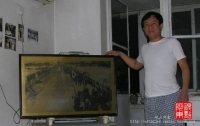| Township: | 北京 | ||
Read works of Fang Jun at 小说之家 | |||
1954 Born in Beijing in 1973 to join the army, joined the CPC in the armed forces. After Japan, "Yomiuri Shimbun," When a Japanese reporter Beijing bureau assistant, following the Japanese Embassy Consular Department. In 1990 a journalist for a newspaper in Beijing, then went to study in Japan, the two universities in Japan studying sociology and economic statistics, in March 1997 to return home. December issued a debut, "I know Guizi Bing", after the newspaper published an article in several articles. Now the work of the Chinese People's Anti-Japanese War Memorial Hall. Part-time in Beijing Academy of Social Sciences Research Center Research Associate-Japanese relations, the Chinese Writers Association. Published works since 1979. Joined the Chinese Writers Association in 1999.
Major works
Have both the "I know Guizi Bing", "last man" and so on. Works by the 1998 Press and Publication Administration Outstanding Book Award, the Eleventh Book Award in China, the Chinese government in 1998 Broadcast Award.
Personal Honors
"People's Daily", "Liberation Army Daily", "Chinese Painting and Calligraphy", "calligraphy News", "Art News", "Calligraphy and Painting" and the CCTV and Jiangsu TV, Shanghai Oriental TV and other media were more than a hundred feature stories . Fine by the Ministry of Culture, Art Museum, Hall of Fame, Zhongnanhai and the collection of party and state leaders. His publications include "Fang Jun Calligraphy Collection", "Fang Jun traveling exhibition of calligraphy works of the country album," Special Report, "the military side? Calligraphy exhibitions in the country the first person." China Federation of artistic achievement was recognized as "outstanding achievements of painting and calligraphy," won the "smashing the twentieth century artist" title.
Work evaluation
Fang Jun's first book, "I know Guizi Bing" selling across. His second masterpiece, "the last group of people" and also to commemorate the 60th anniversary of Sino-Japanese War days to meet with readers.
The book's full name is "1931-1945 witnessed the Japanese invasion of the last group of people", a total of three, currently only published his first book, will be launched after the two.
War fought for eight years, the military side also wrote the book for eight years. Perhaps this is not only a numerical coincidence, it is the military side of the war complex, veterans complex, the historical complex of the highlights again.
Eighth Route Army side is a descendant of Japanese blood flowing in the blood of martyrs. In 1991, when he went to study in Japan is an "alternative students," the year of the invasion of specialized interview veterans. Loaded with the mission of his father, to the sins of the people who killed their parents were ruthlessly tortured soul. After returning to the military side of his fame for writing "I know Guizi Bing", caused a sensation. In his efforts, there have been several over the age of 80 "old devil" to the Chinese public apology.
Since 1997, the military will be the germination of the parties have written "the last group of people," the idea and put it into action. These include: the Eighth Route and New Fourth Army veterans, former KMT anti-Japanese soldiers, Dongbeikanglian veterans, war returned overseas Chinese, to help the Chinese War of Resistance American Flying Tigers, the Hump route of the old pilots, War of the Chinese intellectuals, the Japanese kidnapping of Chinese laborers to Japan, the Japanese kidnapping as sex slaves "comfort women", the civilian victims of war, war, child soldiers and so was born a dozen things. Figure military side characters through these different fates, all-round war to show cruel and tragic history.
Original intention in writing the military side, there are two key words used frequently. One is the "rescue." Fang Jun said: witness the war most of the year are old, the average age of 80 years of age, "I spoke with him today, maybe tomorrow, the only photographs, and interviews with if I do not live in that part of their hearts memory ceased to exist. exaggeration to say that so turn the page of history has passed on. "Therefore, the side arms in a race against time to" rescue "the mentality of historical interviews with writing.
8 years, the military's footprints all over the country side and even extending to foreign countries, a total of 260 people interviewed, the respondents in the age span from 66 years to 105 years old, are the witnesses of the year Sino-Japanese War, the survivors. Fang Jun's Bifeng not only aimed at those people in the shed blood on the battlefield the passionate magnificent, but also described their efforts to plain old age. The story of one reader lamented the introduction of food for thought: The war and national and life are intertwined, how it affects how people of that era and even the fate of their offspring?
Therefore, the significance of this book is not confined to the "war witnesses," "oral history" that point, but the brutal truth of a courage to ask questions, reveal the true legacy of the war the fate of those books.
Translated by Google

